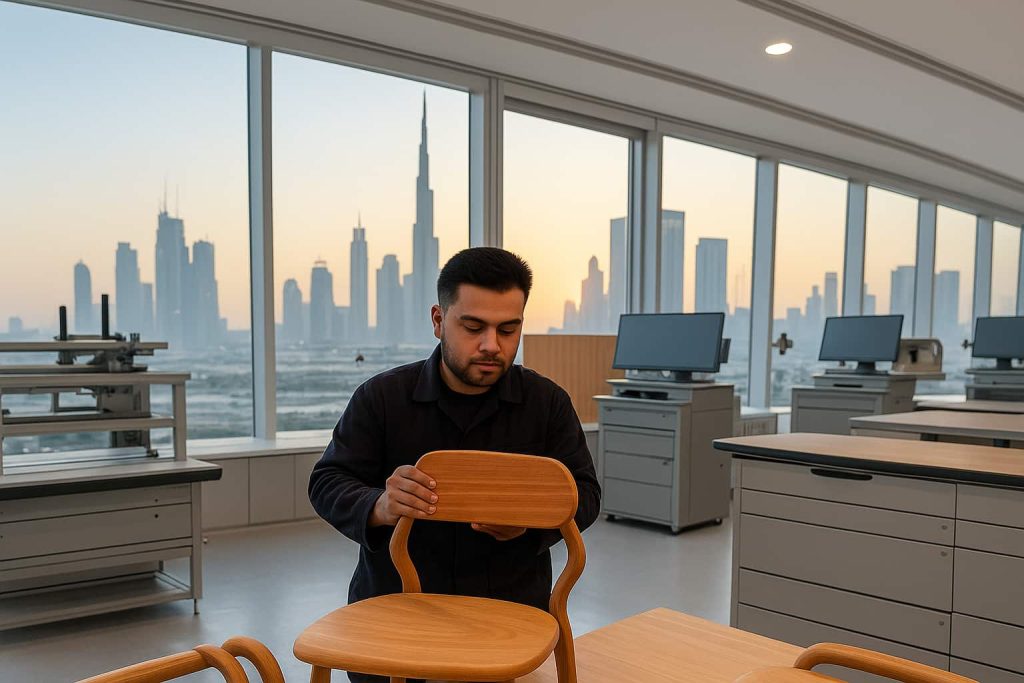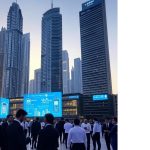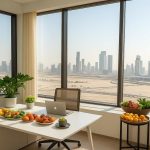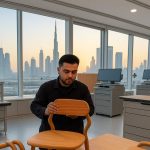Market Analysis and Opportunities
The custom furniture manufacturing sector in Dubai is experiencing robust growth, reflecting the city’s transformation into a global hub for luxury, innovation, and bespoke interior solutions. Increased demand for high-quality, tailor-made residential and commercial furnishings is fueled by high disposable incomes, a thriving real estate market, and the city’s reputation for design excellence. Understanding the UAE market’s dynamics is crucial for entrepreneurs, investors, and managers seeking to seize business opportunities in Dubai’s vibrant furniture manufacturing landscape.
Target Market Analysis
Dubai’s population—a melting pot of over 200 nationalities—has cultivated a unique and diverse demand for furniture that complements various cultural tastes and lifestyles. According to the Dubai Statistics Center and Statista, the UAE’s home and office furniture market was valued at approximately AED 5.5 billion in 2023, with expected CAGR growth of 5–7% through 2027. Key growth drivers include:
- Booming real estate and hospitality sectors, with Expo 2020’s legacy fueling commercial and residential developments.
- Increasing preference for personalized, functional, and design-centric interiors among luxury homeowners, businesses, and property developers.
- A growing segment of affluent expatriates and business owners seeking unique or branded spatial solutions.
Consumers in Dubai exhibit distinct purchasing patterns:
- High brand sensitivity and emphasis on quality, durability, and after-sales service.
- Rising interest in eco-friendly and sustainable products.
- Preference for digitally-enabled experiences (e.g., 3D configurators, AR/VR previews) during purchase journeys.
Industry Trends
Market analysis in Dubai reveals several emerging trends:
- Sustainability: Eco-conscious consumers and government initiatives, such as Dubai Vision 2030, are spurring demand for sustainable, responsibly sourced materials and energy-efficient production processes.
- Digitalization: Integration of digital tools (e.g., online catalogs, virtual showrooms) is reshaping customer engagement and sales channels.
- Smart Furniture: Tech-enabled features—such as wireless charging, modular designs, and integrated lighting—are gaining traction among corporate and residential clients.
Marketing Needs
Intense competition and digitally savvy buyers underline the need for comprehensive marketing strategies. Custom furniture manufacturers in Dubai benefit from:
- In-depth market research to identify niche segments and understand evolving trends.
- Targeted digital marketing campaigns, including SEO, Google Ads, and social media, to reach high-value demographic groups.
- Strong branding and storytelling, highlighting unique features, craftsmanship, and sustainability initiatives.
Recommended tactics for market penetration include influencer collaborations with local designers, immersive online content (e.g., blog articles, client testimonials), and strategic partnerships with interior design firms or real estate agencies. For further guidance, companies can explore specialized sales and advertising services tailored to the UAE market.
Expansion Potential
Dubai’s central location offers unrivaled access to the wider GCC, Africa, and Asian markets. Opportunities exist to:
- Expand into untapped GCC cities (e.g., Abu Dhabi, Riyadh, Doha) where lifestyles and real estate developments align with Dubai’s standards.
- Diversify offerings by targeting B2B clients—such as hotels, offices, and retail spaces—or launching exclusive B2C collections through online platforms.
- Leverage Dubai’s export infrastructure and free trade zones to serve international markets, aided by efficient logistics and direct air/sea connections.
Comprehensive Business Overview
Custom furniture manufacturing in the UAE encompasses the design, fabrication, and delivery of bespoke furniture that caters to individual customer specifications. Operations are typically segmented between residential, commercial/hospitality, and institutional projects, ranging from single-piece orders to large-scale fit-outs.
- Industry: Manufacturing, interior solutions, design and build.
- Business Model: Make-to-order (MTO), design and build, direct sales, B2B partnerships, and online retail integration.
- Target Audience: High-net-worth individuals, luxury homeowners, corporates, hotels, real estate developers, design agencies, and government institutions.
Mission, Vision, and Core Objectives
- Mission: To craft exceptional, tailor-made furniture solutions that blend aesthetic excellence with functional innovation for diverse Dubai and UAE clientele.
- Vision: To become the leading regional authority in custom-made furnishings, synonymous with quality, sustainability, and design leadership.
- Core Objectives: Deliver superior craftsmanship, foster enduring client relationships, drive sustainable innovation, and expand into new markets.
Business Stage and Location
Many market entrants and established businesses operate in growth or mature stages, capitalizing on Dubai’s expanding market. Prime operational locations include:
- Dubai Mainland: Ideal for companies targeting local government contracts or retail operations.
- Dubai Free Zones (e.g., Jebel Ali, Dubai Industrial City): Offer 100% foreign ownership, tax benefits, and streamlined trade logistics.
- Offshore: Suited for international transactions but limited local market access.
For step-by-step guidance on choosing the right setup, consult specialized business setup services.
Competitive Advantage
Entrepreneur Perspective
Custom furniture manufacturing is compelling for founders due to:
- High margins driven by premium, value-added products.
- Low direct competition compared to mass-market offerings.
- Ability to capitalize on Dubai’s design-centric culture and affluent clientele.
- Flexible business models—ranging from boutique studios to automated production lines.
- Opportunity to leverage government incentives and free zone policies for expat entrepreneurs.
Investor Perspective
From an investment viewpoint, the sector offers:
- Strong, consistent demand supported by multiple growth verticals (residential, commercial, hospitality).
- Attractive ROI and scalable operations—especially with technology or export-oriented models.
- Potential for strategic exits via M&A or expanding to global markets.
- Growing attention from venture capital and private equity investors seeking to diversify portfolios in high-growth emerging sectors.
Manager Perspective
Operationally, custom furniture businesses in Dubai benefit from:
- Access to skilled labor and advanced manufacturing tech.
- Strong supplier networks and smart logistics infrastructure.
- Cross-sector collaborations with architects, developers, and designers.
- Supportive regulatory environment and digital transformation opportunities to enhance efficiency (e.g., ERP, cloud-based design platforms).
Financial and Investment Needs
Financial Requirements
Setting up a custom furniture manufacturing business in Dubai involves an initial capital outlay, generally ranging from AED 500,000 to AED 5 million, depending on size and scope.
- Infrastructure: AED 300,000–2 million for leasing or building workshops, showrooms, or storage facilities.
- Equipment/Technology: AED 100,000–1 million for CNC machines, design software, woodworking tools, and IT systems.
- Staffing: AED 100,000–1 million annually, including salaries, visas, and benefits for production crew, designers, sales teams, and managers.
- Licensing/Legal: AED 20,000–100,000 for company setup, regulatory approvals, and trade licenses.
- Marketing: AED 50,000–300,000 per year for digital, offline, and events-based campaigns.
- R&D Innovation: AED 50,000–500,000 for prototyping, new materials, or green initiatives.
Investment Potential
Attractive factors for investors include:
- Consistently high demand and double-digit ROI in well-managed operations.
- Scalable potential—e.g., launching parallel production lines, exporting, or franchising models.
- Suitability for both equity (for long-term partners) and venture capital (for tech-enabled disruptors).
Explore investment consulting services for tailored funding strategies.
Financial Risks and Mitigation
Key financial risks include:
- Upfront capital requirements and extended payback periods, especially in high-end fit outs.
- Fluctuating currency rates impacting imported raw materials.
- Cash flow gaps during project-based assignments or in economic downturns.
Mitigation strategies:
- Diversify client base across sectors and geographies.
- Secure advance payments or stage payments on large projects.
- Implement robust legal contracts and insurance (property, liability, credit risk).
Human Resources and Recruitment
Workforce Needs
Typical staffing includes:
- Designers (CAD experts, interior consultants)
- Carpenters, upholsterers, finishers (skilled tradespeople)
- Sales, marketing, and business development professionals
- Project managers, customer service, and administrative staff
- IT and digital marketing specialists
A mid-sized operation may require 20–80 staff, supplemented by temporary contract workers for large projects.
Critical Skills and Expertise
Success hinges on:
- Technical proficiency in modern joinery and finishing
- Creative design skills attuned to global and regional trends
- Expertise in digital fabrication tools and software
- Experienced managers with knowledge of UAE regulatory frameworks
HR Challenges and Solutions
Potential obstacles:
- Competition for top design and technical talent
- Retention of skilled craftspeople in a high-mobility labor market
- Training gaps in new technologies or customer engagement
Solutions:
- Offer competitive compensation, visa sponsorships, and wellness benefits
- Invest in ongoing training, upskilling, and career development programs
- Foster a collaborative, innovation-driven workplace culture
Compliance with UAE Labor Laws
To maintain compliance:
- Abide by UAE labor law—issue clear contracts, provide medical coverage, and ensure timely wage payments.
- Process work permits and visas through the Ministry of Human Resources and Emiratisation (MOHRE) or relevant free zone authorities.
- Implement end-of-service benefits and robust employee grievance mechanisms.
Staying updated on evolving labor law and HR best practices is essential for sustainable growth.
Infrastructure and Operations
Infrastructure Needs
Physical needs include workshops (minimum 2,000–5,000 sq. ft.), showrooms, and warehousing, ideally in industrial clusters or near major transport corridors.
- Install advanced manufacturing equipment and dust extraction systems.
- Leverage cloud-based design and inventory platforms for remote project management.
- Consider cost-effective solutions such as co-working or shared production spaces for startups.
Operational Optimization
Potential weak spots:
- Supply chain disruptions (imported input delays, cost hikes)
- Inefficiencies in order-to-delivery timelines
- Limited automation leading to higher labor costs or defects
Optimization tips:
- Deploy ERP systems to integrate procurement, design, production, and sales functions.
- Implement lean manufacturing and quality control protocols.
- Pilot automation in repetitive or time-consuming processes.
Legal Compliance
Registering a company in Dubai requires approval from the DED or relevant free zone authority, trade licensing, and opening a corporate bank account. Regular compliance audits and up-to-date documentation (MoA, tenancy contracts) are necessary.
For reliable, streamlined setup, consider trusted business setup partners.
Innovation and Technology
Advanced players leverage:
- 3D printing and digital prototyping for rapid concept-to-market cycles
- Bespoke ERP and supply chain management solutions
- AI-driven customization/trend forecasting tools
Recommended focus areas:
- Adopt AR/VR and virtual showrooms for immersive customer experiences
- Invest in eco-friendly materials and energy-saving production technologies
Marketing and Branding Strategies
Brand Status and Positioning
Successful custom furniture brands in Dubai distinguish themselves through:
- Clear, memorable visual identity (logos, packaging, digital assets)
- Strong brand storytelling around sustainability, luxury, or cultural heritage
- Thought leadership in design media and community events
Continuous investment in branding can elevate perception and attract premium clientele.
Marketing Channels and Optimization
Effective channel mix includes:
- SEO-driven website and online catalogs
- PPC and social media advertising targeted to Dubai’s affluent segments
- Strategic partnerships with real estate, architecture, and interior design platforms
- Presence at premium trade shows and industry events
Optimization involves:
- Regularly updating digital content—see industry blogs and news portals
- Leveraging analytics for campaign refinement
- Utilizing retargeting strategies to increase conversion rates
360-Degree Campaigns
Integrating multiple touchpoints maximizes reach:
- Combined use of social (Instagram, LinkedIn), email marketing, and on-ground showroom experiences
- Co-branded events with influencers or luxury brands
- Loyalty and referral programs to promote word-of-mouth
Success stories can be amplified through featured news and client testimonials, as seen on industry news platforms.
Growth and Development Potential
Growth Strategies
Scalable approaches include:
- Opening additional production facilities within UAE free zones or in high-growth GCC capitals
- Forming joint ventures with international design houses or suppliers
- Launching branded e-commerce platforms catering to global expats
- Expanding into modular or smart furniture lines
Networking
Leveraging powerful networks—such as government-approved service providers, supply chain alliances, and cross-industry partnerships—accelerates growth. For example, tapping into the introduced Persian Horizon’s 57-country network can facilitate cross-border business development.
International Potential
Dubai’s world-class logistics, proximity to major markets, and robust export infrastructure position it as a springboard for global trade. Feasibility factors include:
- Duty-free zones and streamlined export procedures
- Dubai’s reputation as a design and innovation capital attracting international buyers
- Government-backed support for “Made in UAE” initiatives
Sustainability and Innovation
The sector is aligning with:
- Eco-friendly materials (FSC-certified wood, low-VOC finishes)
- Recycling and waste reduction in manufacturing
- Participation in Dubai’s green building and innovation programs
Investing in sustainable practices not only meets regulatory requirements but also attracts a growing base of environmentally conscious customers.
Alignment with Dubai’s Market
Cultural Alignment
Custom furniture manufacturing, when tailored to Dubai’s cosmopolitan tastes, can cater to varied preferences—ranging from Middle Eastern opulence and European minimalism to Asian or African motifs. Key adaptations might include:
- Diverse design options reflective of global and local influences
- Multilingual sales and customer service teams
- Partnerships with community leaders and cultural organizations
Local Regulatory Compliance
To succeed in business in Dubai:
- Strict adherence to UAE’s commercial, tax, and labor frameworks is mandatory
- Timely renewal of licenses, certifications, and permits
- Robust anti-money laundering and corporate governance practices
Partnering with experienced consultants provides an added layer of assurance—see relevant business services.
Advantages of Dubai
Custom furniture businesses in Dubai enjoy:
- Tax-free operations and 100% repatriation of profits in several free zones
- World-class infrastructure, reliable utilities, and advanced logistics
- Proximity to affluent local and international customers
- Robust IP protection, ensuring design exclusivity
Local Challenges and Solutions
Obstacles include:
- High set-up costs relative to smaller GCC markets
- Fierce competition from imported brands and cheaper offshore manufacturing
- Complex regulatory navigation for newcomers
Solutions:
- Differentiation via design, quality, and service
- Strategic location—choosing free zones or industrial areas for operational savings
- Leveraging expert support from business service providers for setup and compliance
Conclusion & Actionable Recommendations
Custom furniture manufacturing presents a compelling opportunity for entrepreneurs and investors seeking high-value, sustainable growth in the UAE’s most dynamic market. With Dubai’s drive for design excellence, innovation, and sustainability, market entrants can thrive by focusing on competitive differentiation, advanced manufacturing, and customer-centricity.
Key recommendations:
- Prioritize market research, strong branding, and digital transformation
- Invest in skilled talent, automation, and sustainable materials
- Leverage Dubai’s advantages for regional and global expansion
- Ensure constant compliance and risk management
- Foster strategic partnerships with designers, developers, and industry associations
To launch or scale your business, seek professional support from organizations like Persian Horizon, who offer regional expertise, comprehensive business setup services, and a broad support network for sustained success.
Ready to unlock the potential of custom furniture manufacturing in Dubai? Take the next step and explore how Persian Horizon’s expertise can streamline every aspect of your business journey in the UAE.










